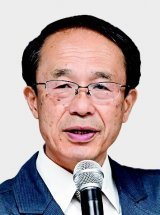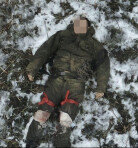218 victims of ‘Mili Atoll incident’ disclosed
218 victims of ‘Mili Atoll incident’ disclosed
Posted June. 08, 2024 08:32,
Updated June. 08, 2024 08:32

A Japanese scholar's research revealed that 218 Koreans, including a 20-year-old man, were taken to Mili Atoll in the Pacific Ocean—a band of coral reef islands—during the Japanese colonial period. They tragically died from gun violence and starvation.
On Friday, Yasuto Takeuchi (67, photo), a researcher on Japanese forced mobilization, spoke at a press conference held at the Gwangju City Council. The event, hosted by the Japanese Forced Mobilization Citizens’ Association, focused on the topic of 'Resistance and Massacre of Koreans Forcibly Mobilized on Chevron Island, Mili Atoll.'
"As a result of manually classifying the list of conscripted victims provided by the Japanese government to the Korean government in 1973, we confirmed that a total of 218 Koreans died on Mili Atoll from 1942 to 1945," said Takeuchi, who has been researching the Mili Atoll massacre since 1990. He also disclosed their last name, hometown, and year of birth, revealing that the youngest person was 20 years old and the oldest was 53.
Mili Atoll is where the Japanese forcibly took 800 to 1,000 Koreans in March 1942 to construct an airfield. When supplies were cut off, the Japanese army killed Koreans and ate their flesh, distributing it as "whale meat." When the Koreans who noticed this resisted, the Japanese soldiers fired machine guns, massacring 55 people. Based on photos taken by the U.S. Navy during the rescue of Koreans, the number of deaths at Mili Atoll was estimated to be at least 125, although the exact number remained unknown.
Takeuchi, a former history teacher, learned of the Mili Atoll incident through an article in the Dong-A Ilbo on Nov. 3, 1990, and has been researching it for over 30 years. He said, "With the 80th anniversary of the Mili Atoll incident approaching next year, I believe the truth about the damage should be revealed to prevent history from repeating itself. I decided to disclose the list so that the bereaved families can participate in the repatriation of the victims' remains and in demanding an apology and compensation from Japan, as well as in memorial activities."
Hyeong-Ju Lee peneye09@donga.com







